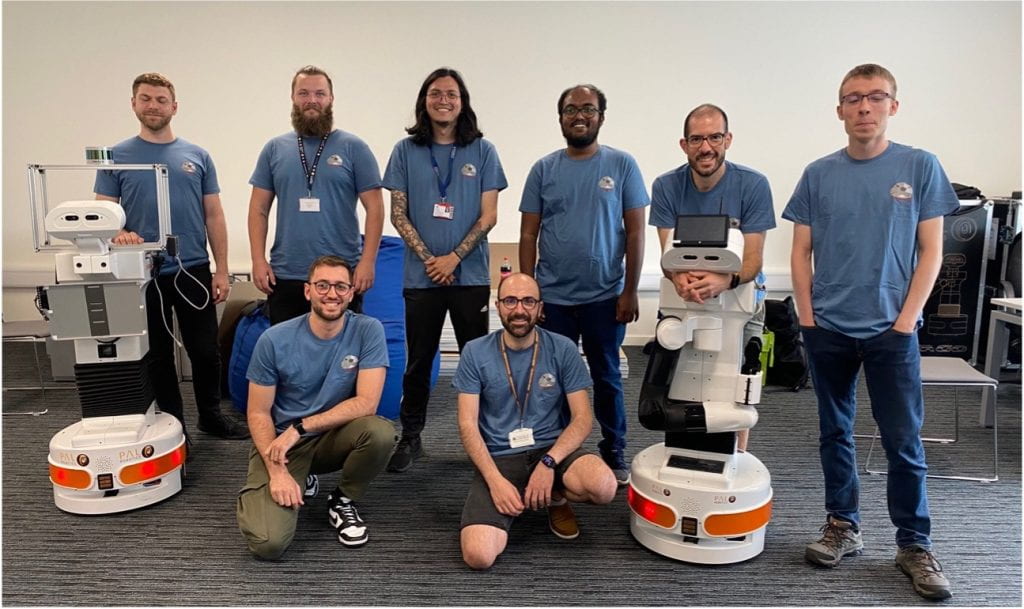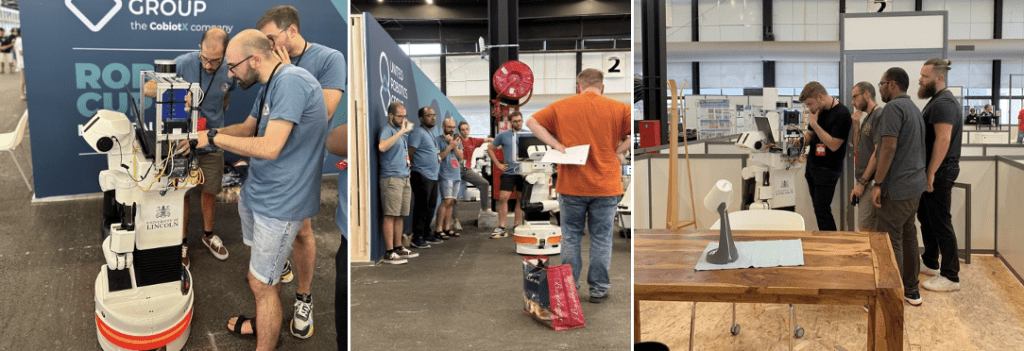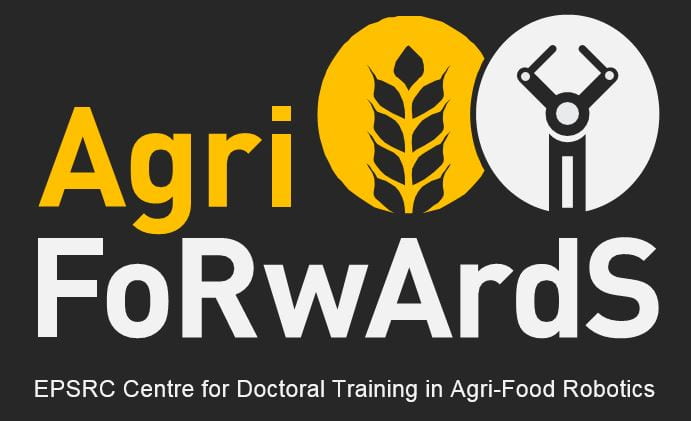On the 4th to the 10th July AgriFoRwArdS Cohort 3 student Alex Elias along with the LCASTOR team members travelled to Bordeaux, France to take part in Robocup 2023.
Robocup 2023
Written by Alex Alias
For nearly 25 years, RoboCup has been the world’s biggest robotics and artificial intelligence competition. Not only is it a competition but it brings together thousands of researchers and students from all over the world around a common ambition: to share knowledge and innovation.
There is not just one challenge in this week-long event, it now covers all the major scientific and technological challenges of autonomous robotics. Some of the challenges addressed are search/ rescue, soccer, industry, simulation, logistic and home and within each of those challenges there are three different leagues that people can compete in, the major, junior and the test league.
This year myself and the other members of the LCASTOR team had the opportunity and privilege to attend the 26th addition of the RoboCup and be a part of the 2,500 participants from 45 countries with their 2,000 robots.

3:00 AM Wakeup
The trip began with a 3am wakeup call and a 2-hour car journey to the airport on a cold Monday morning, and the first task that we faced was trying to fit six people, their suitcases and hand luggage’s in a seven-seater car. After we worked out the logistics and packed ourselves in like sardines playing Tetris with the bags we were on the move. Having some breakfast at the airport just before our flight and we were off by 8am.
On arrival we were greeted at the terminal by representatives from the robot cup who were extremely helpful telling us about the transport around Bordeaux and what was the best way for us to attend the competition from our hotel by the harbour.

Getting to Work
As soon as we got to the hotel we unpacked and got straight to work, we had three days before the competition started and we used nearly every minute coding and debugging to make sure we were ready to tackle the different challenges of the RoboCup getting up at 7am and staying at the competition until 10:30pm each day.
Before the competition started, we also needed to create a high-fidelity environment map of the house arena that the robots were going to be in completing the challenges set out, we did this using lidar scanners to identify which furniture is on the map and where it was located to allow TIAGo to move freely without crashing.
As this was our first year, we selected only three of the challenges in the Stage 1 of the competition which were “Carry my Luggage”, “Storing Groceries” and the “Receptionist” with the goal to be in the top 50% of contestants to be able to progress to Stage 2 of the competition.

The Receptionist Challenge
Although we had be working vigilantly since we landed in Bordeaux the Thursday came around all to quickly and with that the first day of the competition was under way starting with the “Receptionist” challenge. For this challenge the robot had to take two new guests to the living room to introduce them and offer a free place to sit. Once the guest had arrived at the door they had to have a conversation with the robot receptionist giving their name as well as their favourite drink, with this information once all guests had arrived and sat on the sofa the robot would need to introduce the new guests to the host of the simulated party identifying the person’s name and favourite drink.
We used Whisper AI as a speech to text AI tool so that the robot was able to understand what the guests were saying by training an extremely large dataset on the set names that were provided as well as multiple combinations of drinks and how the guest could say these phrases.
As always things never go to plan no matter how much prepare, when it was our turn just before we were testing/ debugging as any team would. To do that we had to turn the navigation/mapping off so that the robot wouldn’t move around whilst we testing phrases such as “my name is Axel” and “my favourite drink is milk” for example but whilst doing this forgot to reactivate the navigation/mapping meaning the task was completed but the robot remained stationary.
After this was made clear we were aloud another turn the following day and after the robots previous stage fright had been resolved we were able to complete the first challenge; even when the referees threw an curve ball by giving the robot an name for one of the guests that wasn’t in the predefined list. Even so, we were still able to correctly identify the name of the guest, unfortunately no extra points were awarded for our intuitive little robot.
Storing Groceries Challenge
The next challenge was “Storing Groceries” where the robot was asked to support a person in identifying which objects are located on a table and placing them in a cupboard, correctly matching objects categories. For example, TIAGo needs to place (or suggest placing) a banana next to a pear and not next to a packet of crisps.
Due to our lack of a manipulation expert on the team our team focused all out energy on object detection and decided to instruct the human assistant through speech recognition in order to manipulate the object. This led to us incurring a small penalty but allowed us to score points in other aspects of this challenge.
Carry my Luggage Challenge
The final task of the day and the last of which we were competing in was “Carry my Luggage” challenge where the robot had to help the operator to carry some luggage to a car which is parked outside. For this challenge we were outside of the arena and in amongst the crowd of people who came to watch, the first challenge was to identify which of the two bags the invigilator was pointing at and once correctly identified go and pick up the bag.
With the bag successfully identified and in the robots gripper, the robot needed to follow the invigilator around avoid obstacles successfully in which the robot was even able to manoeuvre successfully around and average size coke can (15cm) on the floor.
Everything was going well until the robot was unable to reidentify the invigilator once he was out of view of the robot which gave us further penalty points as in this challenge every time the robot asked for the invigilator to come stand back in front of it points would be deducted.

Result!
Overall, we participated in 3/5 of the challenges for stage 1 of the competition as this was our first year attending the event as the team LCASTOR we wanted to focused on achievable goals and to get a better understanding of the competition. In the end once all the scores were added up, in our category we came 11th out of 15 competing teams and was the highest scoring British team in our event.
To progress to stage 2 of the competition we needed to be in the top 50% of teams and had to have completed another challenged in stage 1 but to be able to score as high as we did with only participating in three of the challenges really made us proud and more determined to work even harder this year to get ready for RoboCup24 which is going to be hosted in the Netherlands.

Once we had finished competing, we used the rest of the time to not only improve our own code to get a head start on next year, but we had time to walk around and watch some of the other competitions that were being held at the same event.
We went to go see the bulky search and rescue robots that were manoeuvring over harsh arena terranes as well as some of the simulated environment competitions, but what I most enjoyed was going to see all of the different soccer competitions as there were a variety of different robots that were being used to compete across all small, medium and large soccer games.
Closing Ceremonies
With the closing ceremonies all done and dusted building the excitement for next year’s RoboCup it was time to socialise and network with the after party of the event. We started in the large conference hall where food and wine were on constant rotation; it was a great way for all teams from all different competitions to come together to have fun looking back on the hectic week we all experienced.
Luckily once the venue closed the afterparty event carried on at this mesmerising open-air bar that was right next to the stadium in which we had been eyeing across the water every day when we sat outside for lunch, where the conversations and drinks continued to flow for the rest of the night.

Although the work was intense and we rarely found time, especially in the first couple of days, to catch our breath we still made sure to venture out to local bars and restaurants to apricate the French dining experiences.
From the freshly baked bread and pastries that woke us in the mornings from the bakery’s that scattered the landscape as far as the eye could see, to the roof top bars with the views of the city and the setting sun to help wash down our evening meals. I have to insist, as someone who has never been to France before, Bordeaux is an absolute must even – in 34 degrees heat – I think I can speak for everyone in the team when I say that it was truly brilliant experience.

Sight Seeing!
With the competition finished for another year we had a couple of days remaining before we had to come back to reality of rain and offices, we took this opportunity to take it some of the sights and really apricated Bordeaux for all its beauty and wonder.
Our hotel was a little far out from the city centre and walking in the blistering heat was tedious, but with stunning views right the way throughout Bordeaux made it all worth it. We walked up La Garonne River into the city centre and several times stopping to marvell at the French architecture. We also went for an guided tour at the Cite du Vin Wine Museum and closed the evening with an boat taxi back to our hotel.
With the few days that we did have free I feel as though we managed to fit in most of the city’s natural beauty and left apricating the history of wine an little more.

And Just Like that
And just like that it was over and we were heading back home a little sleep deprived but ten days full of excitement and French food will do that. Overall, the experience was amazing and I would like to thank my whole LCASTOR team for an amazing, insightful time away.
I was able to further my knowledge operating TIAGo in which before I started the RoboCup I only had a few months experience working with the robot for my MSc project last summer. I was also able to network on probably the largest scale so far by being emersed with people all across the world from multiple different universities all with different backgrounds and research interests.
Again, as I have said multiple times throughout previous blog posted I highly recommend making some time in your busy schedules to try out new things even if they don’t directly link with your research as spending time working on other small project really helps me to focus and helps me when I am stuck in my own research.
I have come back from RoboCup after spending some time away from my research and I am more motivated and ready to hit the ground running after coming up with some new ideas and approaches whilst I was away which I wouldn’t have been if I had spent the last two weeks sat at my desk trying to figure everything out.
Thank you
A huge thank you to Alex Elias who attended the event and for provided this fantastic biography of the week. Moreover, a huge thanks to the LCASTOR team for working so hard to put Lincoln Robotics on the global map.
Do you want to get involved in the CDT?
If you are interested in learning more about what we do and if you share a passion for agriculture and technology then go to our AgriFoRwArdS CDT website to see more about our research, how you can be involved, and how to apply to be a student in the program.


Be First to Comment